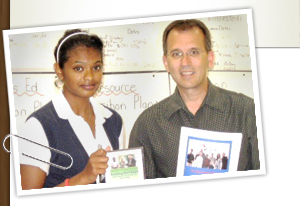Transition Planning
The transitions from elementary to junior high, then to high school, and finally to life after school are of special concern for educators and family members of students who need extra support. Good, implementable plans throughout and especially as the student approaches graduation can make the difference between having a meaningful life as a citizen of their community and a valued friend and sitting at home alone and bored through many years of adult life.
Transition Planning is one of the most obvious areas where educators can help their students with and without disabilities to maintain and deepen their social connections.
Various approaches:
School boards across the Canadian provinces generally require that such planning be carried out and often have mandated transition planning processes and guidelines. Some agencies and parent groups prefer non-school based planning processes, such as the Marsha Forest Centre’s MAP and PATH planning tools. Sometimes both approaches are used to good effect, one building upon the other.
Working with family members:
Working with family members is a vital aspect of education and, in particular, of transition planning. As an educator, you have a unique perspective. Because you likely have a little more distance than family members, you may be able to offer them new insights into their son or daughter’s strengths and needs. You may notice interests or talents in your student that they have not noted or that are not manifest at home. You also move in different social circles than the family members and may hear of different opportunities. Families often feel alone and overwhelmed as they look towards their young person’s needs after graduation. Your working with them will help families feel supported. Try truly to come together as a team to coordinate efforts around your student.
In this document, Dr. Gary Bunch emphasizes the importance of family-educator collaboration onthe transition planning that is often absent for young adults with disabilities.
Some of the young people who contributed to this website - Aine in BC and Kim in Ontario - attended post-secondary programs that they found helpful. This document provides several links to post-secondary opportunities and information for thinking about going on to college.


